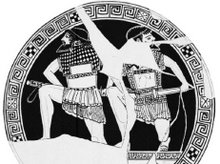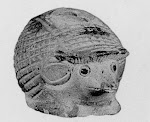Change has come to Hollow Lakedaimon. You will note that we are no longer the online syssition, we have laconized to the online Phitidion. Phitidia is what the common messes were called at Sparta, so I have broken down and made the change though I do like the sound of syssition much more. Here's what Plutarch had to say:
Plutarch, Life of Lycurgus chapter 12:
(1) As for the public messes, the Cretans call them andreia, but the Lacedaemonians phitidia, either because they are conducive to friendship [philia] and friendliness, or because they accustom men to simplicity and thrift, for which their word is pheidô. But it is quite possible, as some say, that the first letter of the word phitidia has been added to it, making phitidia out of editia, which refers merely to meals and eating. (2) They met in companies of fifteen, a few more or less, and each one of the mess-mates contributed monthly a bushel [medimnos] of barley-meal, eight gallons of wine, five pounds [mnai] of cheese, two and a half pounds of cheese, two and a half pounds of figs, and in addition to this, a very small sum of money for such relishes as flesh and fish. Besides this, whenever any one made a sacrifice of first fruits or brought home game from the hunt, he sent a portion to his mess. For whenever any one was made late by a sacrifice or the chase, he was allowed to dine at home, but the rest had to be at the mess. (3) For a long time this custom of eating at common mess-tables was rigidly observed. For instance, when King Agis, on returning from an expedition in which he had been victorious over the Athenians, wished to dine at home with his wife, and sent for his rations, the Polemarchs refused to send them to him; and when on the following day his anger led him to omit the customary sacrifice, they laid a fine on him.
(4) Boys also used to come to these public messes, as if they were attending schools of sobriety; there they would listen to political discussions and see instructive models of free behavior [eleutheria]. There they themselves also became accustomed to sport and jest without scurrility, and to endure jesting without displeasure. Indeed, it seems to have been especially characteristic of a Spartan to endure jesting; but if anyone could not bear up under it, he had only to ask it, and the jester ceased. As each one came in, the eldest of the company pointed to the door and said to him, "Through that door no word goes forth outside." (5) And they say that a candidate for membership in one of these messes underwent the following ordeal. Each of the mess-mates took in his hand a bit of soft bread, and when a servant came along with a bowl upon his head, then they cast it into this without a word, like a ballot, leaving it just as it was if he approved of the candidate, but if he disapproved, squeezing it tight in his hand first. (6) For the flattened piece of bread had the force of a perforated, or negative, ballot. And if one such is found in the bowl, the candidate is not admitted to the mess, because they wish all its members to be congenial. The candidate thus rejected is said to have been 'kaddished' [kekaddisthai], for kaddichos is the name of the bowl into which they cast the pieces of bread. (7) Of their dishes, the black broth [zomos] is held in the highest esteem, so that the elderly men do not even ask for a bit of meat, but leave it for the young men, while they themselves have the broth poured out for their meals. And it is said that one of the kings of Pontos actually bought a Spartan cook for the sake of having this broth, and then, when he tasted it, disliked it; whereupon the cook said, 'O King, those who relish this broth must first have bathed in the River Eurotas.' After drinking moderately, they go off home without a torch; for they are not allowed to walk with a light, either on this or any other occasion, that they may accustom themselves to marching boldly and without fear in the darkness of night. Such, then, is the fashion of their common messes.
Friday, May 21, 2010
Subscribe to:
Post Comments (Atom)





3 comments:
Khaire, O Phile
I am a newcomer to your blog and found your article to be very interesting; I never thought about the aspis being designed primarily as a breathing protector, but your argument is strong. I'll have to keep thinking about this for a while, but your paper was excellent.
It was especially interesting after reading selections from Heath and Hanson's Who Killed Homer? in which certain aspects of Greek military history figured prominently.
Hope to chat with you soon -
Best,
Ed DuBois (ECD)
Hi!
I liked the fact that lanterns were not allowed when walking at night. This shows that they used everyday aspects in training as well. They would have an edge in night fighting which is always good to have. The article is a good one.
-Craig (a.k.a.-Astiryu1)
Loved readding this thank you
Post a Comment